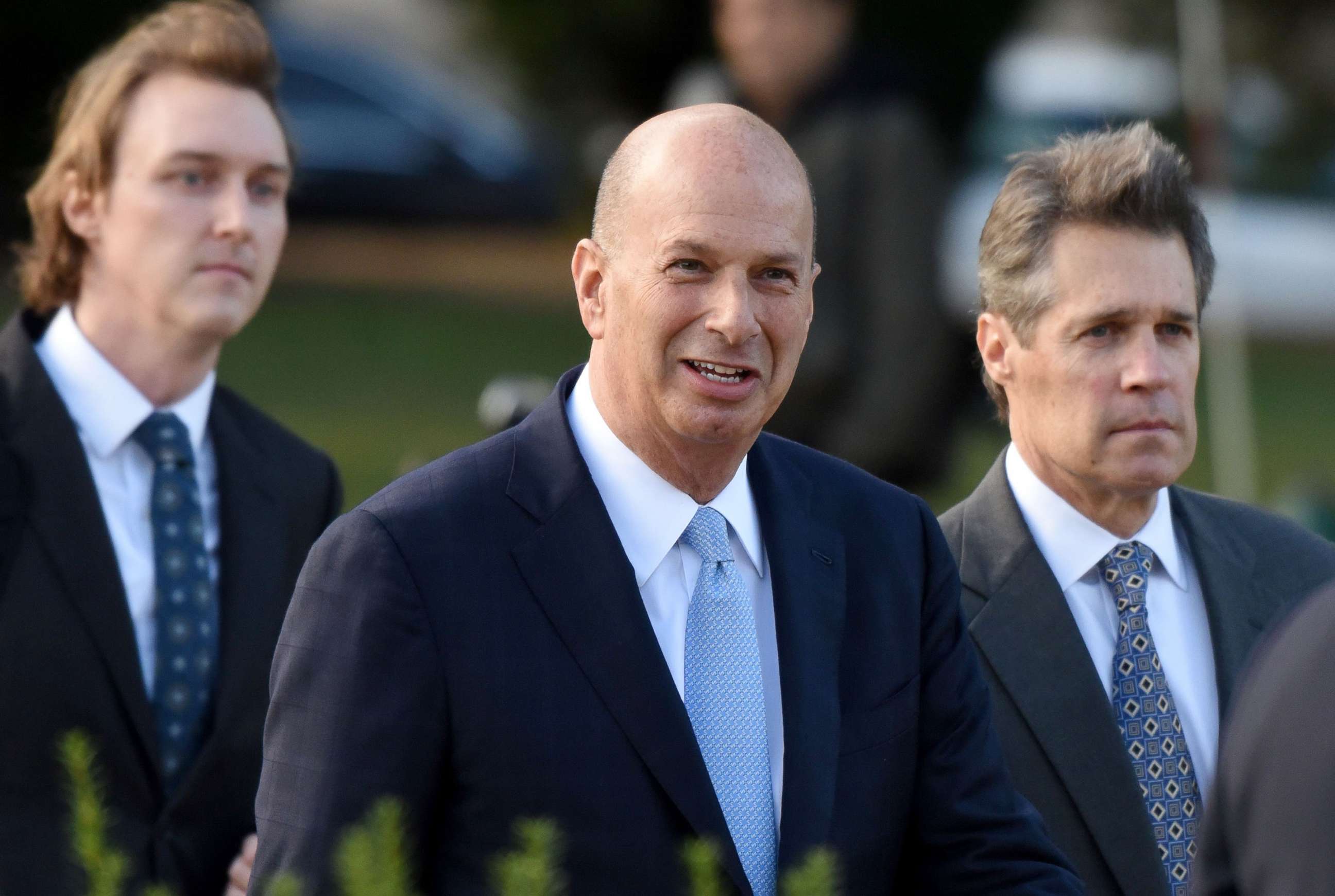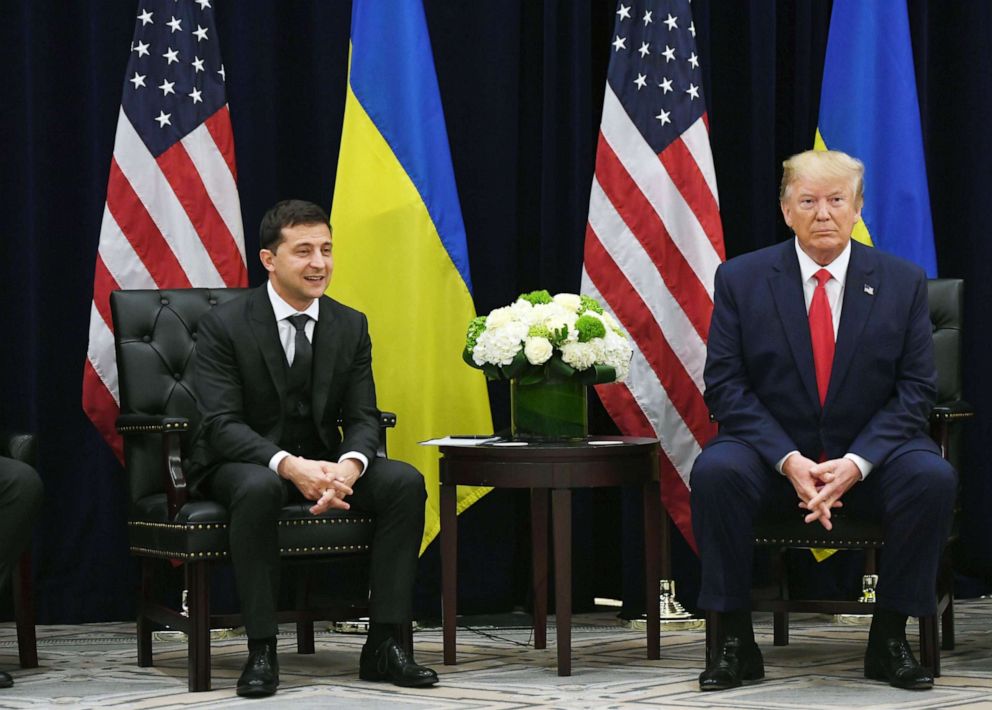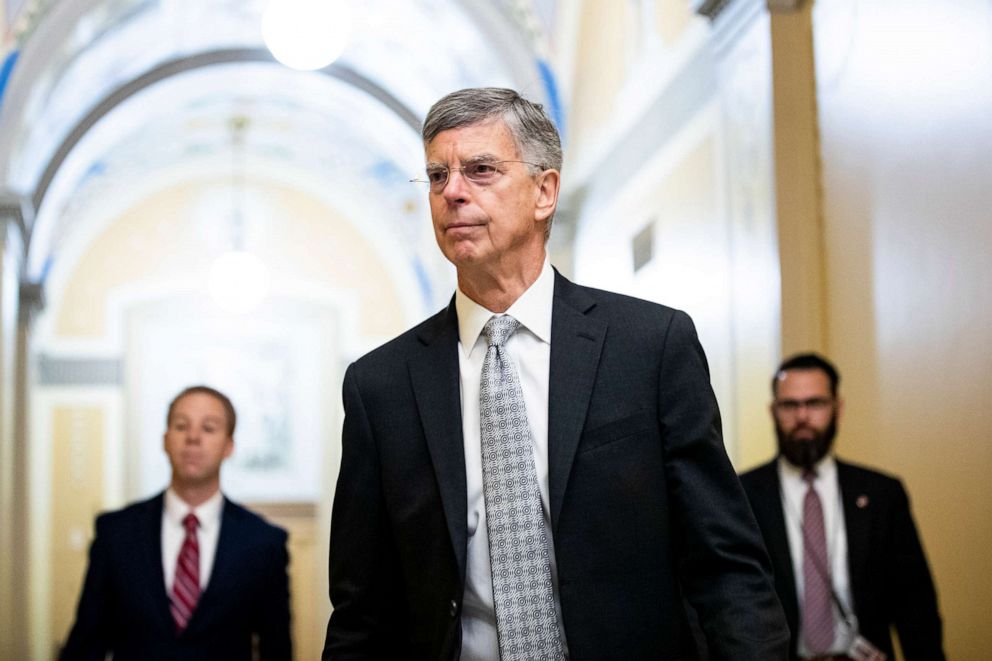In revised testimony, Sondland contradicts Trump, describes quid pro quo with Ukraine
Democrats released his account in a push to make the impeachment probe public.
Gordon Sondland, a key witness in President Donald Trump’s impeachment inquiry, said he personally delivered the message to a top Ukrainian official that U.S. military aid was contingent upon the country’s ability to launch an investigation that Trump wanted, according to testimony released Tuesday.
The disclosure of a direct "quid pro quo" was made in congressional testimony Sondland revised after he said other witnesses "refreshed my recollection about conversations involving the suspension of U.S. aid."

His remark directly contradicts repeated assertions by Trump, the White House and GOP lawmakers that there never was a quid pro quo.
"I always believed that suspending aid to Ukraine was ill-advised, although I did not know (and still do not know) when, why, or by whom the aid was suspended," said Sondland.
Sondland, a Trump megadonor who was given a top diplomatic post after the election -- U.S. Ambassador to the European Union -- said he said he had come to suspect by early September that the nearly $400 million in military aid was contingent upon Ukraine’s willingness to launch an investigation wanted by Trump and Trump’s personal lawyer, Rudy Giuliani. Following a Sept. 1 meeting in Warsaw involving Vice President Mike Pence and Ukrainian President Volodymyr Zelenskiy, Sondland pulled aside one of Zelenskiy’s top aides, Andrey Yermak.
"After that large meeting, I now recall speaking individually with Mr. Yermak, where I said resumption of U.S. aid would likely not occur until Ukraine provided the public anti-corruption statement that we had been discussing for weeks," Sondland said.
Trump has long bristled at the conclusion by U.S. intelligence agencies and a bipartisan Senate investigation that Russia interfered in the election to bolster his chances of beating Hillary Clinton. The president and his personal lawyer, Rudy Giuliani, have instead pushed the unsubstantiated theory that Ukraine – not Russia –hacked the Democratic emails with the goal of helping Clinton.

According to a White House rough transcript of his July 25 call with Zelenskiy, Trump asked for the foreign leader to investigate the origins of 2016 election meddling as well as his 2020 rival, Joe Biden, and the role Biden’s son, Hunter, played on the Ukrainian gas company Burisma.
Sondland told the committee in his opening statement that he was aware of Trump’s demands for an investigation into Burisma but not of the Biden link and assumed it was part of an anti-corruption push.
"Inviting a foreign government to undertake investigations for the purpose of influencing an upcoming U.S. election would be wrong, he told House impeachment investigators in his original statement. "Withholding foreign aid in order to pressure a foreign government to take such steps would be wrong. I did not and would not ever participate in such undertakings. In my opinion, security aid to Ukraine was in our vital national interest and should not have been delayed for any reason."
In a statement released Tuesday, White House press secretary Stephanie Grisham said that recent testimony shows there’s "less evidence for the illegitimate impeachment sham than previously thought." As evidence, she pointed to Sondland saying that he didn’t know who or why the aid was suspended but had just presumed it was linked to Trump’s demands for an investigation.

Several days after Sondland told Ukraine that military aid was on the line, Bill Taylor -- the top U.S. diplomat in Ukraine – texted he thought such a quid pro quo was "crazy." Taylor, Sondland and other government aides thought the money was in the best interest of the U.S. because it was needed to help the new Ukrainian government fend off Russian aggression.
Sondland said he wanted to address Taylor’s concerns and called the president directly. In that phone call, he said Trump repeatedly said there was "no quid pro quo." He later revised his testimony to note that he couldn’t recall if he had more than one phone conversation with the president.
Last month, acting White House chief of staff Mick Mulvaney confirmed the existence of a quid pro quo but later tried to walked back his remarks.
"We do that all the time with foreign policy. And I have news for everybody – get over it," Mulvaney said at a press conference. "There’s going to be political influence in foreign policy."
Mulvaney later said his comments were "misconstrued" and that there was no quid pro quo related to military aid.
House Democrats on Tuesday also released the transcript of a closed-door deposition of Kurt Volker, the former special envoy to Ukraine.
In a statement, the three chairs of the House committees conducting the impeachment inquiry said, "The testimony of Ambassadors Volker and Sondland shows the progression of efforts by the President and his agent, Rudy Giuliani, to use the State Department to press Ukraine to announce investigations beneficial to the President’s personal and political interests."
The Sondland testimony can be read here.
ABC News' Benjamin Siegel, Liz Alesse, Avery Miller, Allison Pecorin, Megan Hughes, Jordyn Phelps, Sarah Kolinovsky, Katherine Faulders, John Parkinson, John Santucci, Justin Fishel, Soo Rin Kim, Lucien Bruggeman and Sophie Tatum contributed to this report.



